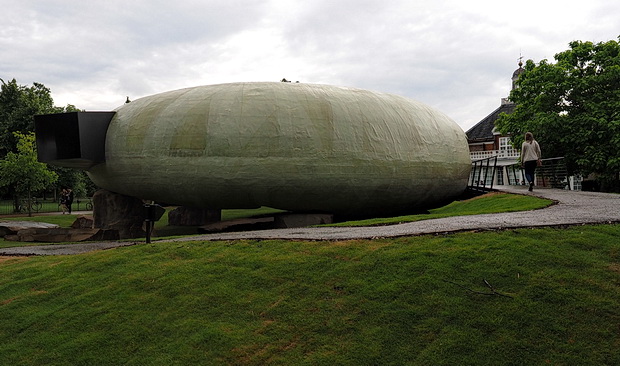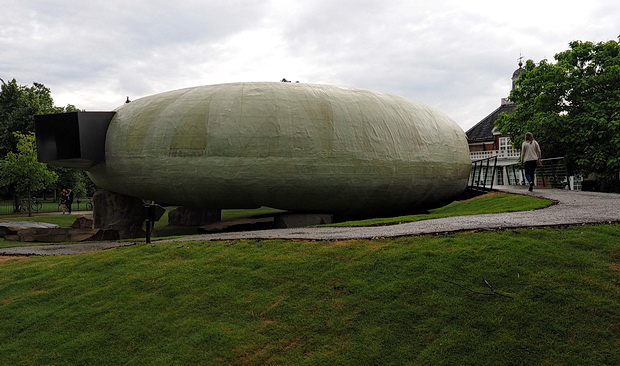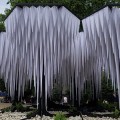
Since 2000, the Serpentine Gallery in Hyde Park has commissioned a temporary summer pavilion by a leading architect, and this year’s offering is perhaps the oddest – and best – one yet.
Created by Chilean architect Smiljan Radić, the egg-like structure stands on top of huge boulders, and manages to look both stone age and futuristic at the same time.
Created from fibreglass with an unpolished finish, a square window contrasts with other open areas that look like they have been cracked open by an unknown force.
Visitors can walk inside the toroid interior, and by day there’s a small cafe operating ,with a programme of talks and performances taking place some evenings.
On the official website, Smiljan Radić, the architect has published a statement about his work:
The Serpentine Pavilion 2014 continues a history of small romantic constructions seen in parks or large gardens, the so-called follies that were popular from the late sixteenth century to the beginning of the nineteenth century.
In general, follies appear as ruins or have been worn away by time, displaying an extravagant, surprising and often archaic form. These characteristics artificially dissolve the temporal and physical limits of the constructions into their natural surroundings.
The 2014 Pavilion takes these principles and applies them using a contemporary architectural language.
The unusual shape and sensual qualities of the Pavilion have a strong physical impact on the visitor, especially juxtaposed with the classical architecture of the Serpentine Gallery.From the outside, visitors see a fragile shell in the shape of a hoop suspended on large quarry stones.
Appearing as if they had always been part of the landscape, these stones are used as supports, giving the pavilion both a physical weight and an outer structure characterised by lightness and fragility.
The shell, which is white, translucent and made of fibreglass, contains an interior that is organised around an empty patio at ground level, creating the sensation that the entire volume is floating.
The simultaneously enclosed and open volumes of the structure explore the relationship between the surrounding Kensington Gardens and the interior of the Pavilion.
The floor is grey wooden decking, as if the interior were a terrace rather than a protected interior space.
At night, the semi-transparency of the shell, together with a soft amber-tinted light, draws the attention of passers-by like lamps attracting moths.
I loved the pavilion: here’s a selection of photos showing off some more interior and exterior views. Details of opening times and location are at the bottom of the page.
The small cafe.
The structure was created by layering fibreglass sheets over a doughnut-shaped mould, with the resulting translucent skin measuring just 10mm thick.
More info:
The Serpentine Pavilion is next to the Serpentine Gallery in Kensington Gardens, and will remain in place until 19 October, 2014, with opening hours being 10am – 6pm, Tuesday – Sunday, plus bank holidays (note: it will be closed on the 1 and 2 July).
Entrance is free during the day, but there may be a charge for special events.
Serpentine Pavilion
Kensington Gardens
London W2 3XA
T +44 (0)20 7402 6075
information@serpentinegalleries.org
Map location
Nearest tube stations: Lancaster Gate, Knightsbridge or South Kensington
Main bus routes: 9, 10, 52, 94, 148


